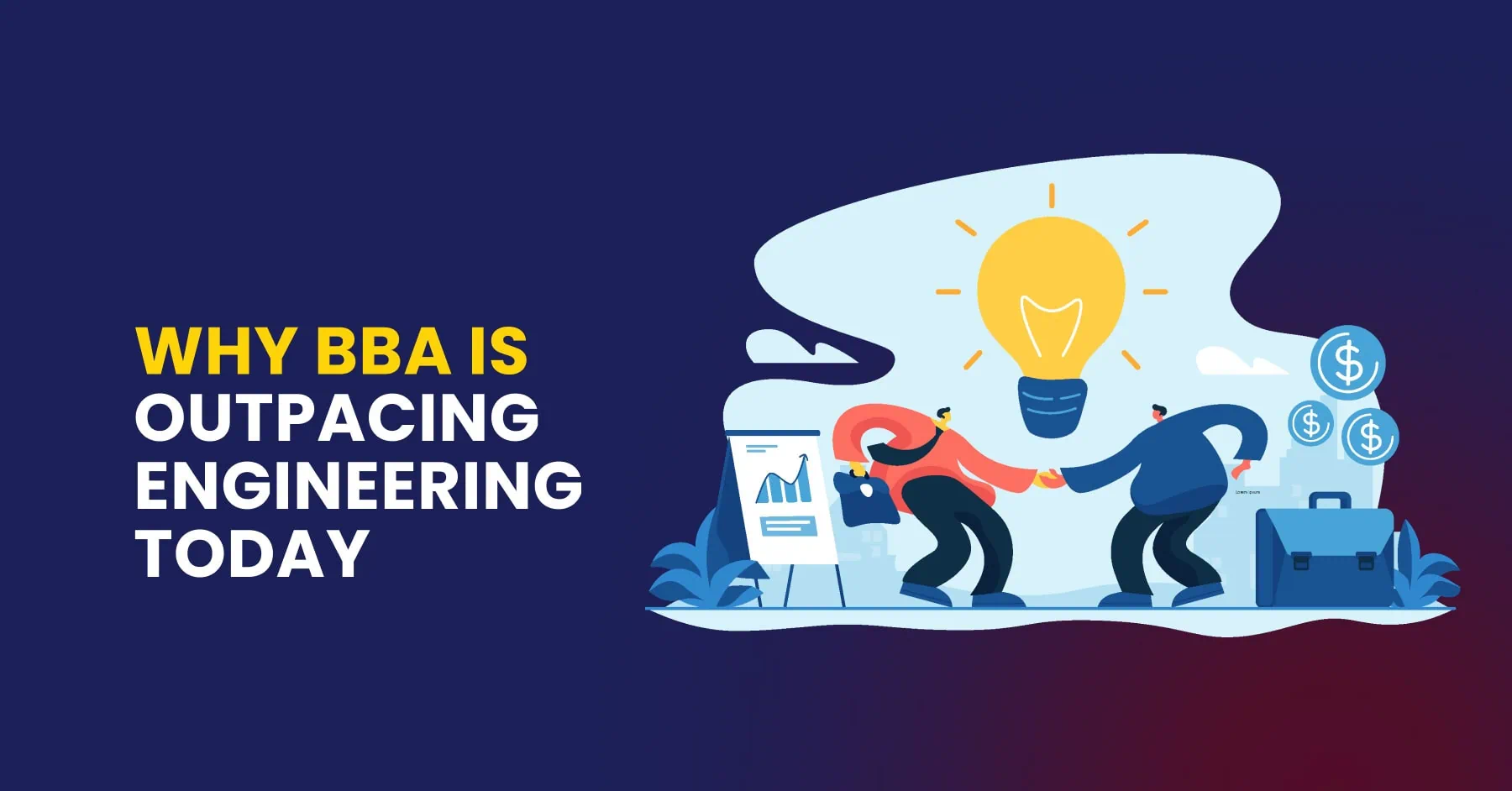Engineering has been considered the default golden career option for most science
stream students in India for decades. It was the golden ticket to a secure future, a stable job, and social prestige. But things are changing and fast. A new wave of students is now looking at the BBA (Bachelor of Business Administration) as a compelling, practical, and future-ready career option.
So, is BBA becoming the new engineering? Let’s explore why a growing number of Class 12 students are shifting gears and choosing business over blueprints and technical proficiency.
Course Overview: BBA Vs Engineering
What is BBA?
A Bachelor’s of Business Administration is a four-year degree course that focuses on building the fundamentals of business, marketing, finance, operations, and human resources. The program also develops students’ practical, managerial, communication, and leadership skills. It involves case practices, internships, industrial visits, and interactions with industry professionals, equipping students holistically and setting them up for their careers.
What is Engineering?
Engineering courses cover a wide range of disciplines, including the traditional ones like civil, mechanical, and electrical engineering, along with more specialized areas like computer science, aerospace, and biotechnology. Such programs are offered at the bachelor’s (B.E./ B.Tech.) level, which generally include 4 years to complete, while diploma programs take 3 years. The program makes every student job-ready.
Reasons for New-Age Career Path Replacing Engineering
The Rise of Business Awareness Among Teens
Today’s Gen Z students are more entrepreneurial than any generation before. With shows like Shark Tank India, digital startups booming, and social media influencers becoming a brand ambassadors, most importantly Indian Government Promoting Entrepreneurs, students are constantly exposed to the business world.
So the new-age mantra is: “Why wait for an MBA when I can start early with a BBA?”
A BBA degree introduces you to the fundamentals of business, Marketing, Finance, Entrepreneurship, Human Resource Management, Operations, Data Analytics, and More right after school. It’s no longer considered just a stepping stone to an MBA, but a launchpad for careers in management, startups, and corporate roles right after your class 12.
Multiple Career Pathways
Unlike engineering, where the first job often depends on the specialization (Mechanical, Civil, IT, etc.), BBA opens up a flexible range of career options. Students can move into diverse sectors like: Digital Marketing, Finance and Banking, Business Analytics, Retail Management, Operations and Logistics, Human Resources, Startups, and Entrepreneurship. SO, you’re not locked into one stream and direction. With the right BBA program, you can shape your career to match your passions and skill set.
Industry-Driven Curriculum
Modern BBA colleges are updating their curriculum to align with industry needs. Courses now integrate real-world case studies, internships, live projects, and even certifications in digital tools like Google Ads, Excel, Tableau, and more.
This skill-based learning and experiential approach makes BBA graduates job-ready right after graduation. Employers are actively hiring fresh BBA talents for roles that previously required MBAs.
The Tech-Business Blend
Today, even technology companies are hiring more business graduates. Whether it’s for sales strategy, product management, customer success, or digital marketing, tech firms need fresh business minds to scale and manage their operations.
Lower Pressure, Higher Impact.
Let’s be honest: engineering can be intense (especially when it contains more than 50+ subjects over 4 years and innumerable practicals and assignments!!). On the other hand, BBA offers a balanced academic life, with a focus on creativity, communication, and Collaboration skills are in high demand across industries and among entrepreneurs.
Why Choose Inspiria Knowledge Campus for BBA?
Inspiria Knowledge Campus is a great choice for BBA students because of its industry-focused curriculum, modern facilities, and good placement help. The practical-based learning approach, internships, and placement opportunities make students future-ready. All of these factors contribute to a holistic learning environment, building a student both inwardly and outwardly for future success.
The institution, is affiliated with Maulana Abul Kalam Azad University of Technology (MAKAUT) and AICTE-approved. It offers high-quality education that is in line with industry demands. Inspiria’s emphasis on practical learning, industry readiness, and global exposure helps students lay a solid basis for successful careers in startups and industries.
Conclusion: A Smart Move for the Smart Generation
Engineering is still a powerful field, but it’s no longer the only prestigious option. BBA is emerging as a dynamic, modern alternative, especially for students who want to combine creativity with commerce, and logic with leadership.
A BBA degree is a key to unlock a broad spectrum of career opportunities across diverse sectors. Moreover, learning about business and entrepreneurship not only widens your mind to the skills required to run a business but also gives you the required motivation to launch a new startup. As student aspirations evolve and industries demand new kinds of talent, BBA is fast becoming the course of choice for those who think ahead.








